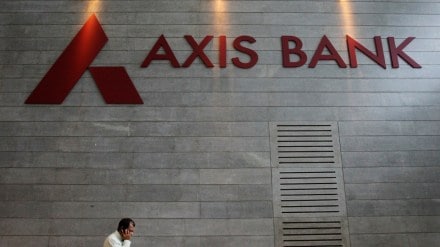The Axis Bank share price continues its uptrend after international brokerage house UBS upgraded it to Buy with a revised price target of Rs 1,500 from Rs 1,300. This implies 17% upside from current levels. The brokerage said the bank is entering a phase where liability pressure is easing, asset quality concerns are stabilising, and sector liquidity is turning supportive, resetting the risk-reward in favour of the stock.
UBS on Axis Bank: valuation discount now too wide
UBS said Axis Bank’s 12-month stock performance has stayed muted. The shares are up 11% over the past year, similar to Nifty but less than Bank Nifty’s 17%. The brokerage pointed out that loan growth moderation and higher-than-peer slippages kept the stock rangebound, widening the valuation gap with ICICI Bank, HDFC Bank and Kotak Mahindra Bank.
Axis now trades at 1.5x FY27 estimated book value, which is almost two standard deviations below its five-year average and at a 26% discount to ICICI Bank and 23% and 8% discounts to HDFC Bank and Kotak, respectively. UBS considers this gap excessive given the improving macro setup. The brokerage expects re-rating potential as quarterly metrics show steady recovery across loan growth, deposit mix, credit costs and return ratios.
UBS on Axis Bank: Loan growth to accelerate as retail stress stabilises
According to UBS, Axis Bank’s loan book in the first half of FY26 grew at a modest pace but sector-level data now suggests that retail credit card and personal loan stress is stabilising. SME overdue indicators at large private banks are showing similar trends. That, coupled with improved liquidity conditions, should allow Axis to expand its loan book by 14–15% annually in FY26–FY28. The share of retail deposits (based on LCR) has improved to 54%, while LCR is steady at about 120%, in line with peers. UBS believes this gives the bank balance sheet room to capture credit demand once deposit repricing aligns with the softer rate environment.
UBS on Axis Bank: Margins likely to improve by FY27
UBS modelled another 25 basis points rate cut in 2025, which may keep near-term margins subdued. But the bank should benefit from gradual deposit repricing and CRR cuts, with net interest margin expected to move towards 3.8% in FY27, up from the expected FY26 level of 3.3%. The brokerage expects net interest income to rise to Rs 65,593 crore in FY27 from Rs 56,964 crore in FY26.
UBS on Axis Bank: Credit costs already near peak
Axis Bank’s slippages and credit costs have been elevated for the past few quarters, but UBS sees the worst behind it. It estimates credit cost declining to around 80 basis points in FY27–FY28, compared with its FY26 estimate of 1.1%. The improvement, it said, will be supported by stronger recoveries and stabilising delinquency trends in unsecured retail loans across the industry. UBS highlighted that SME overdue numbers for large private banks also indicate steady behaviour, which bodes well for Axis.
UBS on Axis Bank: Operating leverage to return as costs ease
Axis Bank has been absorbing integration-related expenses over the past few years. UBS expects a moderation in overall operating expenditure beginning FY27. It projects a cost-to-income ratio decline from 45.9% in FY26 to 44.8% in FY27 and 43.2% in FY28, helping push pre-provision operating profit growth to nearly 15% CAGR over FY26–FY28.
Return ratios to move toward 1.7% ROA and 15% ROE. With better margins, controlled credit costs and rising loan growth, UBS expects Axis Bank’s return ratios to move higher. It forecasts ROA at 1.7% and ROE near 15% by FY28, up from FY26 estimates of 1.5% ROA and 13.3% ROE.
UBS raises earnings forecasts for Axis Bank
UBS raised its earnings estimates for FY26–FY28 by 1–4%, projecting FY27 net profit of Rs 32,206 crore, up from Rs 25,659 crore in FY26. It expects FY28 profit to reach Rs 37,818 crore. The upgraded estimates reflect stronger fee income, slightly higher margins, and a more moderate credit cost trajectory.
UBS on Axis Bank: Key risks
The brokerage noted that a slower-than-expected pick-up in loan growth or deterioration in retail asset quality could delay the recovery. Additionally, sharper declines in lending rates could compress margins further. But given the current setup, UBS sees these risks as manageable relative to the re-rating opportunity for investors.
